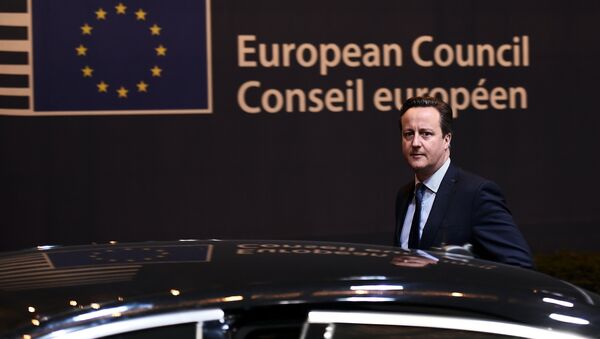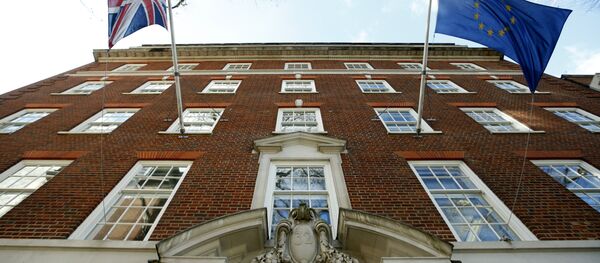Cameron has been under pressure to negotiate a "new settlement" on the UK's membership of the EU against a backdrop of growing euroskepticism in Britain as a whole, but within his Conservative Party in particular.
His major demands were for the UK not to participate in "ever closer union", an "emergency brake" on benefits given to EU migrant workers in the UK and non-discrimination of non-eurozone countries. However, despite weeks of glad-handing EU leaders ahead of the summit — which finished at 2200 CET Friday — Cameron was forced to go through the mill amid stiff opposition to his demands.
I have negotiated a deal to give the UK special status in the EU. I will be recommending it to Cabinet tomorrow. Press conference shortly.
— David Cameron (@David_Cameron) 19 февраля 2016
The Daily Mail's opinion column said: "The prime minister comes out of this sorry saga badly wounded, just eight months after his surprise election triumph made him look all but invincible on the domestic political battleground. But it is not too late for him to redeem himself. He should tell voters, humbly and frankly, that he has tried hard but failed to secure a deal worth having."
Migrant Worker Benefits
Central to the deal was Cameron's attempt to prevent migrant works enjoying the same benefits as UK citizens from the moment they started working in the country — something deeply opposed by most Eastern European countries which have thousands of workers in the UK.
The deal sates that there should be "an alert and safeguard mechanism" whereby "The Council would authorize that Member State to limit the access of newly arriving EU workers to non-contributory in-work benefits for a total period of up to four years from the commencement of employment. The limitation should be graduated, from an initial complete exclusion but gradually increasing access to such benefits to take account of the growing connection of the worker with the labor market of the host Member State. The authorization would have a limited duration and apply to EU workers newly arriving during a period of 7 years."
However, the declaration goes on to say: "The future measures referred to in this paragraph should not result in EU workers enjoying less favorable treatment than third country nationals in a comparable situation."
Belgian Prime Minister Charles Michel said: "We are very, very far from the initial British position that wanted to create a discrimination," suggesting there had been a climb down on Cameron's part.
Never Closer Union
Cameron managed to gain acknowledgement that "make it clear that the references to ever closer union do not apply to the United Kingdom" and some confirmation of non-discrimination against non-eurozone countries. The declaration said: "Discrimination between natural or legal persons based on the official currency of the Member State, or, as the case may be, the currency that has legal tender in the Member State, where they are established is prohibited."
However, in a rider, it said:
"Any difference of treatment must be based on objective reasons", without stating what "objective reasons" were, leaving a wide margin for future argument. It also carried a warning that London would not be able to stop any future consolidation of Eurozone states. "Member States whose currency is not the euro shall not impede the implementation of legal acts directly linked to the functioning of the euro area and shall refrain from measures which could jeopardize the attainment of the objectives of economic and monetary union."
Cameron has faced criticism over the issue of whether the whole declaration on the UK's "new settlement" has any basis in law also remain uncertain. The European Council statement says that "this Decision is legally binding" but then goes on to say it "may be amended or repealed only by common accord of the Heads of State or Government of the Member States of the European Union," which leaves the whole matter up for discussion in the future.
One significant fallout from the night's event is the news that big-hitter and Cameron ally, justice minister Michael Gove has become the first cabinet minister to defy the prime minister and campaign for the UK to leave the EU. This immediately prompted the proprietor of the London Times and the popular tabloid The Sun Rupert Murdoch — who has close ties with Cameron — to tweet:
Congratulations Michael Gove. Friends always knew his principles would overcome his personal friendships.
— Rupert Murdoch (@rupertmurdoch) 20 февраля 2016
Cameron may think he has won a victory in Brussels, but he now faces an uphill struggle back home to convince voters — and many in his own party — that the deal is anything more than a classic EU fudge.





